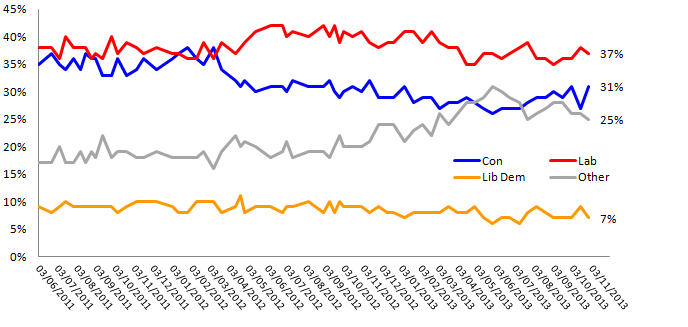Political Polling – 29th October 2013
29th October 2013
Labour’s lead has dropped to 6 points after a temporary boost to 11 points in the last poll. The party has 37% of the vote while the Conservatives regain some temporarily lost ground and rise four points to 31%.
UKIP are on 16% and the Lib Dems drop to 7%.


| † | % | Change |
| Conservative | 31 | +4 |
| Labour | 37 | -1 |
| Liberal Democrats | 7 | -2 |
| Other parties | 25 | -1 |
Other Parties (breakdown)
| † | % | Change |
| UKIP | 16 | -1 |
| Green | 3 | -1 |
| SNP | 4 | +1 |
| BNP | 2 | +2 |
| Plaid Cymru | 1 | n/c |
| Other | 0 | n/c |
Approval ratings
- Little change this week. David Cameron’s net approval rating remains at -18% with 32% approving and 50% approving of the job the prime minister is doing
- Ed Miliband has seen a minor drop with his net rating falling from -19% to -21%. 25% approve of the job the Labour leader is doing while 46% disapprove. However, Mr Miliband has held on to improvements he saw among Labour voters after the party conferences, retaining a net approval rating of +44%
- Lib Dem leader Nick Clegg drops to -46% net approval with 13% approving and 59% disapproving compared to 16% who approved in the last poll
| † | % Approve | % Disapprove | Net rating | Net rating (own party) |
| David Cameron | 32% | 50% | -18% | +76% |
| Ed Miliband | 25% | 46% | -21% | +44% |
| Nick Clegg | 13% | 59% | -46% | +36% |
Opinium Research carried out an online survey of 1,957 GB adults aged 18+ from 29th October 1st November 2013. Results have been weighted to nationally representative criteria.
Interview Method and Sample
This survey is conducted online by CAWI (computer aided web interviewing), using Opinium?s online research panel of circa 30,000 individuals. This research is run from a representative sample of GB adults (aged 18+ in England, Scotland and Wales). The sample is defined from pre-collected registration data containing gender, age (18-34, 35-54, and 55+), region (North East, North West, Yorkshire and Humberside, East Midlands, West Midlands, East of England, London, South East, South West, Wales, and Scotland), working status and social grade to match the latest published ONS figures.
Opinium also takes into account differential response rates from the different demographic groups, to ensure the sample is representative.


